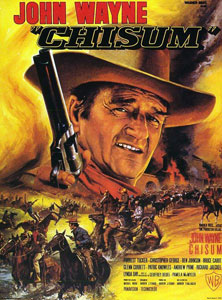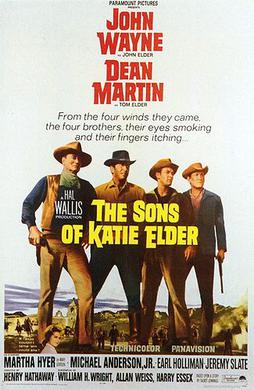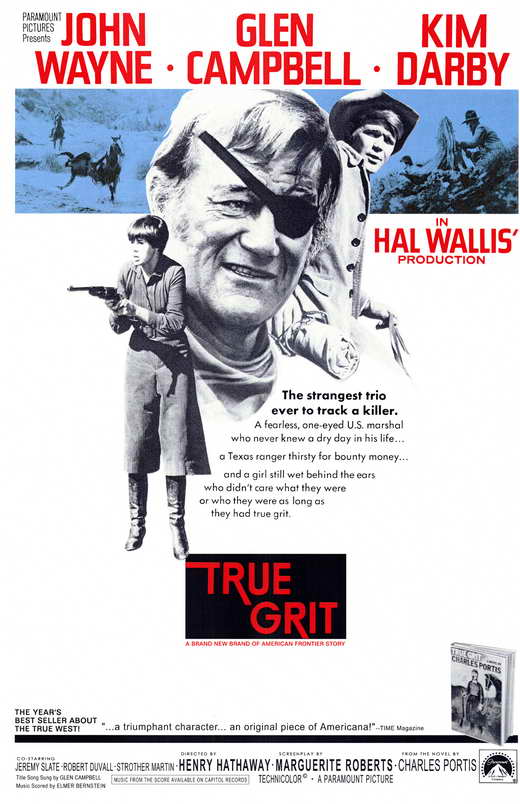In a passing conversation one of my colleagues had an observation about a not so contemporary screen actor – the late John Wayne. I forget the wording but the observation and concurrent opinion weren’t complimentary – a circumstance I still need to remedy. I was and remain incensed, and not a little baffled. Who doesn’t like John Wayne?
Yes he was an unrepentant right-winger with a good heart who covered both himself and the wrongs of the day in a shroud of patriotism that didn’t abide doubts. Somewhere people forgot he was a Hollywood entertainer, not a Washington statesman. I never particularly held his political beliefs in much regard. I like to watch his movies, they entertain me. I don’t watch them to be informed; I go elsewhere for that.
Maybe I’m too much a product of my childhood and its indelible memories – watching the 4:30 movie with one of my brothers; seeing True Grit or Chisum at the Squire or Playhouse theaters when they first came out; going to a John Ford marathon my freshman year of college. I find his pictures or at least the ones I like to be timeless. I can always watch them; they’re the perfect movies for a rainy day, or a really miserable cold one.
So if I have the blanket, popcorn and the opportunity, what would I watch? Here’s my short list in random order, other than #1, my all-time favorite John Wayne movie.
1.  Chisum, 1970. Forrest Tucker, Ben Johnson, Glenn Corbett and Christopher George. A highly fictionalized and entertaining account of the Lincoln County (New Mexico) Land War. Wayne is John Chisum an established cattleman who has a broad view of the future of the Territory, shares resources with his neighbors, is good to his employees and is ready to enjoy the fruits of his labor. He’s also nobody’s fool. Forrest Tucker is the Murphy come lately who wants to buy everything up and is bribing the Territorial governor to take army beef contracts from Chisum and use stolen cattle (Chisum’s) to fulfill the contracts. Among the roles portrayed are those of Pat Garrett and Billy Bonney (Billy the Kid) who were involved in the dispute both on the “good” side. Chris George gives a great performance as a rattlesnake mean, gimpy bounty hunter turned sheriff who owes his limp to Bonney.
Chisum, 1970. Forrest Tucker, Ben Johnson, Glenn Corbett and Christopher George. A highly fictionalized and entertaining account of the Lincoln County (New Mexico) Land War. Wayne is John Chisum an established cattleman who has a broad view of the future of the Territory, shares resources with his neighbors, is good to his employees and is ready to enjoy the fruits of his labor. He’s also nobody’s fool. Forrest Tucker is the Murphy come lately who wants to buy everything up and is bribing the Territorial governor to take army beef contracts from Chisum and use stolen cattle (Chisum’s) to fulfill the contracts. Among the roles portrayed are those of Pat Garrett and Billy Bonney (Billy the Kid) who were involved in the dispute both on the “good” side. Chris George gives a great performance as a rattlesnake mean, gimpy bounty hunter turned sheriff who owes his limp to Bonney.
2. El Dorado, 1966. Robert Mitchum and James Caan. Wayne is Cole Thornton a professional gunfighter who might be hired by the conniving . . . Ed Asner. Thornton might have to go up against his longtime friend the town sheriff played by Mitchum, who has become a hopeless washed-out drunk. You have the bad guys, the fewer good guys, each one a little deficient, and a town that’s uninterested or cowed by circumstances. You learn that gunfighters have ethics and a code of conduct. Another great supporting role by Christopher George as the other fastest gun. Conventional views are that El Dorado is Howard Hawks’ remake of his own earlier Duke film Rio Bravo from 1959. Sort of the same premise though it’s a drunk deputy (Dean Martin,) and Wayne is the sheriff. Besides Martin, the cast includes Ward Bond (he’s the cop in It’s a Wonderful Life) Ricky Nelson (don’t ask, it’s not worth it,) and Angie Dickinson.
Thornton a professional gunfighter who might be hired by the conniving . . . Ed Asner. Thornton might have to go up against his longtime friend the town sheriff played by Mitchum, who has become a hopeless washed-out drunk. You have the bad guys, the fewer good guys, each one a little deficient, and a town that’s uninterested or cowed by circumstances. You learn that gunfighters have ethics and a code of conduct. Another great supporting role by Christopher George as the other fastest gun. Conventional views are that El Dorado is Howard Hawks’ remake of his own earlier Duke film Rio Bravo from 1959. Sort of the same premise though it’s a drunk deputy (Dean Martin,) and Wayne is the sheriff. Besides Martin, the cast includes Ward Bond (he’s the cop in It’s a Wonderful Life) Ricky Nelson (don’t ask, it’s not worth it,) and Angie Dickinson.
 3. The Sons of Katie Elder, 1965. Wayne is John Elder the oldest of 4 brothers (Earl Holliman, Dean Martin and Michael Anderson Jr. are the other 3) who come back together to bury their saintly (and destitute) mother in Clearwater, Texas. John Elder is a professional gunfighter who’s stayed away for many years; mom covering for him with the neighbors. When the brothers do come back to bury her and settle the estate, the true extent of her poverty surprises them. Turns out they aren’t the best of sons, and . . . their mom was fleeced out of prime real estate by the local tycoon – James Gregory (Barney Miller’s old boss) whose fidgety son is played by a young Dennis Hopper. Gregory hires George Kennedy (maybe the only other actor with Wayne’s presence and size) to make sure the Elder boys don’t ask too many questions. Gregory also convinces the law that the Elders are up to no good – he frames them for stealing cattle and murdering the beloved sheriff Billy Watson played beautifully by Paul Fix. Right prevails, though John Elder shows remarkable restraint until the last 1/3rd of the movie after one of the brothers is killed. Great performances, great scenery and a great score by Elmer Bernstein.
3. The Sons of Katie Elder, 1965. Wayne is John Elder the oldest of 4 brothers (Earl Holliman, Dean Martin and Michael Anderson Jr. are the other 3) who come back together to bury their saintly (and destitute) mother in Clearwater, Texas. John Elder is a professional gunfighter who’s stayed away for many years; mom covering for him with the neighbors. When the brothers do come back to bury her and settle the estate, the true extent of her poverty surprises them. Turns out they aren’t the best of sons, and . . . their mom was fleeced out of prime real estate by the local tycoon – James Gregory (Barney Miller’s old boss) whose fidgety son is played by a young Dennis Hopper. Gregory hires George Kennedy (maybe the only other actor with Wayne’s presence and size) to make sure the Elder boys don’t ask too many questions. Gregory also convinces the law that the Elders are up to no good – he frames them for stealing cattle and murdering the beloved sheriff Billy Watson played beautifully by Paul Fix. Right prevails, though John Elder shows remarkable restraint until the last 1/3rd of the movie after one of the brothers is killed. Great performances, great scenery and a great score by Elmer Bernstein.
4. They Were Expendable, 1945. The movie actually stars Robert Montgomery and Wayne is in the supporting role, but it’s a John Wayne movie. It’s based on the actual exploits of a US Navy Torpedo Boat Squadron in the Philippines at the outbreak of WWII, as recounted in the book They Were Expendable. Wayne is Rusty Ryan the Executive Officer of the squadron, chafing at the career opportunities he feels he’s losing in the bathtub navy. The war breaks out and Ryan reverts to being the loyal and aggressive commander that Montgomery’s John Brickley needs him to be. Along the way is a very PG romance with a beautiful Donna Reed and backup by one of the best “B” supporting casts in a movie; Ward Bond, Jack Holt, Marshall Thompson, Murray Alper, Jack Pennick (a Wayne regular,) and Harry Tenbrook. The movie does a credible job at showing the frustrations and loneliness of sailoring, the reliance on shipmates, and the inevitability of their situation. Again, taken from actual events is the role this group of boats played in secreting General MacArthur and his family from Luzon 560 miles to Mindanao in 66ft. plywood boats.
Montgomery and Wayne is in the supporting role, but it’s a John Wayne movie. It’s based on the actual exploits of a US Navy Torpedo Boat Squadron in the Philippines at the outbreak of WWII, as recounted in the book They Were Expendable. Wayne is Rusty Ryan the Executive Officer of the squadron, chafing at the career opportunities he feels he’s losing in the bathtub navy. The war breaks out and Ryan reverts to being the loyal and aggressive commander that Montgomery’s John Brickley needs him to be. Along the way is a very PG romance with a beautiful Donna Reed and backup by one of the best “B” supporting casts in a movie; Ward Bond, Jack Holt, Marshall Thompson, Murray Alper, Jack Pennick (a Wayne regular,) and Harry Tenbrook. The movie does a credible job at showing the frustrations and loneliness of sailoring, the reliance on shipmates, and the inevitability of their situation. Again, taken from actual events is the role this group of boats played in secreting General MacArthur and his family from Luzon 560 miles to Mindanao in 66ft. plywood boats.
Tossup between Sands of Iwo Jima, 1949 and True Grit, 1969.
 5. I have to come down on the side of True Grit; it has a more universal appeal and stands the test of time a little better. Maybe it’s that he’s just more believable as a cowboy than as a modern soldier or marine. Wayne is the one-eyed, over-the-hill and under-the-bottle Rooster Cogburn, a US Marshal for the Oklahoma Indian Territory. Cogburn is hired by Maddie Ross (an oddly asexual Kim Darby) to find Tom Chaney, the man who killed her father in Fort Smith, Arkansas. They are joined by the dapper (and wholly unconvincing) Glenn Campbell as Texas Ranger LaBeauf. They take off after Chaney who’s taken up with ”Lucky” Ned Pepper, one of Robert Duvall’s best roles – early or otherwise. The high point is the lone Wayne on horseback facing off against Pepper and 3 of his gang with the action initiated by one of Wayne’s most memorably delivered lines and an equally erudite retort.
5. I have to come down on the side of True Grit; it has a more universal appeal and stands the test of time a little better. Maybe it’s that he’s just more believable as a cowboy than as a modern soldier or marine. Wayne is the one-eyed, over-the-hill and under-the-bottle Rooster Cogburn, a US Marshal for the Oklahoma Indian Territory. Cogburn is hired by Maddie Ross (an oddly asexual Kim Darby) to find Tom Chaney, the man who killed her father in Fort Smith, Arkansas. They are joined by the dapper (and wholly unconvincing) Glenn Campbell as Texas Ranger LaBeauf. They take off after Chaney who’s taken up with ”Lucky” Ned Pepper, one of Robert Duvall’s best roles – early or otherwise. The high point is the lone Wayne on horseback facing off against Pepper and 3 of his gang with the action initiated by one of Wayne’s most memorably delivered lines and an equally erudite retort.
Rooster Cogburn: “I mean to kill you in one minute, Ned. Or see you hanged in Fort Smith at Judge Parker’s convenience. Which’ll it be?”
Ned Pepper: “I call that bold talk for a one-eyed fat man.”
There’s good, there’s bad, there’s the grey area between the two that we sometimes hate to acknowledge in our world, and there’s a story-line that’s easy to follow.
I remember both seeing the movie when it came out and reading the Charles Portis novel, and being impressed at how the movie followed the book. When I saw the 2010 remake with Jeff Bridges I thought it was nothing less than an homage to the original, not a blatant effort to be a better movie. Having said that, Matt Damon so outdoes Glenn Campbell that the 2010 production is a worthy successor.
There are of course many others, including The Searchers, considered his best critical role, and I may mention them in another posting, but these are my go-to favorites. Take note, they’re good for the beginner too.
- Richard
Filed under: Uncategorized Tagged: Chisum, Dean Martin, El Dorado, Hollywood, John Wayne, movies, Richard, Rio Bravo, Robert Duvall, Robert Mitchum, Sons of Katie Elder, the Duke, They were expendable, True Grit, Ward Bond, Westerns
